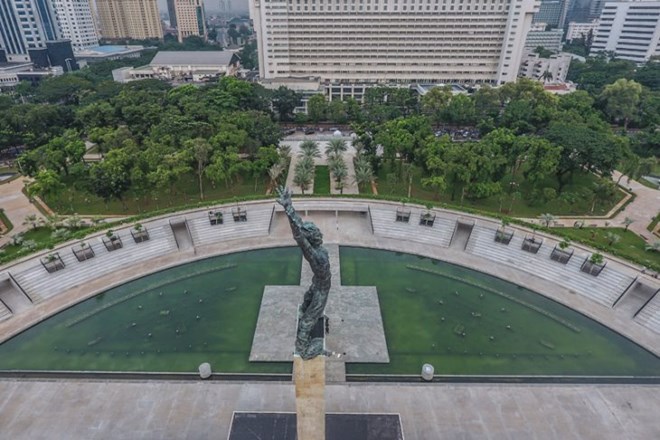Indonesia makes plans to create eco-friendly cities

A park in Banteng Square, Central Jakarta (Photo: Antara)
The Indonesian Government plans to create eco-friendly cities across the country on an ongoing basis by striving to implement better waste management practices.
The plan and an outline on eco-friendly cities was announced by the Ministry of Environment and Forestry at the ongoing 10th High-Level Seminar on Sustainable Cities, which is taking place on Indonesia’s Bali island on January 21-23 with the participation of ASEAN member countries and partners.
Speaking at the event, General Director of the ministry’s Department of Waste and Toxic Hazardous Materials Management Rosa Vivien Ratnawati said the high-level seminar, which has been held since 2017, has expanded its focus to the multidimensional nature of urban development, especially regarding environmental issues. As such, Indonesia strives to focus on waste management in urban areas in order to develop eco-friendly cities.
Ratnawati explained that since 2015, the percentage of Indonesians living in urban areas has been higher than those living in villages, reaching 59.35 percent of the total population.
Moreover, she remarked that some 82.37 percent of the Indonesian population is projected to live in urban areas by 2045. This will have a considerable impact on the landfill and waste management in cities due to the increase in human activities, she pointed out.
Ratnawati further stressed that waste-related problems in turn not only affect the quality of health and the environment at the local level, but also at the global level, especially plastic waste which has spread across the seas and caused irrefutable pollution damage.
The Indonesian Government has committed to managing waste better, as reflected in Presidential Regulation No.97 of 2017 on National Policies and Strategies for Household Waste Management.
The regulation mandated that central and local governments must achieve “100 percent waste management”, comprised of 30 percent waste reduction and 70 percent waste recycling.
Based on the fact that Indonesia is an archipelagic country that relies on the sea as a vital asset, the Government has prioritised solutions towards the problem of marine plastic waste.
The Indonesian Government also issued Presidential Regulation No.83 of 2018 on Marine Waste Management aimed at reducing 70 percent of the waste leaking into the sea by 2025.
In addition to environmental issues, the High-Level Seminar on Sustainable Cities focused on aligning Indonesia’s national development planning with the 2030 Agenda on Sustainable Development.
VNA
- Danger warning issued for Thailand’s Bangkok as extreme heat bites (25/04)
- UK supports ASEAN’s economic integration (25/04)
- ASEAN Future Forum 2024 looks to ensure comprehensive security for community (24/04)
- Malaysia, Philippines warn of severe heat in upcoming summer (24/04)
- Malaysia sees increased number of young millionaires (22/04)
- Indonesia to deploy over 5,000 police officers to secure World Water Forum (22/04)
- Indonesia: Ruang volcano's eruption forces 11,000 people to evacuate (21/04)
- EU seeks consensus amid a series of challenges (20/04)
 UK supports ASEAN’s economic integration
UK supports ASEAN’s economic integration
 Danger warning issued for Thailand’s Bangkok as extreme heat bites
Danger warning issued for Thailand’s Bangkok as extreme heat bites
 Malaysia, Philippines warn of severe heat in upcoming summer
Malaysia, Philippines warn of severe heat in upcoming summer
 ASEAN Future Forum 2024 looks to ensure comprehensive security for community
ASEAN Future Forum 2024 looks to ensure comprehensive security for community
 Indonesia to deploy over 5,000 police officers to secure World Water Forum
Indonesia to deploy over 5,000 police officers to secure World Water Forum
 Malaysia sees increased number of young millionaires
Malaysia sees increased number of young millionaires
 ASEAN foreign ministers call for end to Myanmar violence
ASEAN foreign ministers call for end to Myanmar violence
 EU seeks consensus amid a series of challenges
EU seeks consensus amid a series of challenges
 Thailand welcomes over 10 mln foreign arrivals so far this year
Thailand welcomes over 10 mln foreign arrivals so far this year
 Indonesia’s Ruang volcano erupts, hundreds evacuated
Indonesia’s Ruang volcano erupts, hundreds evacuated



